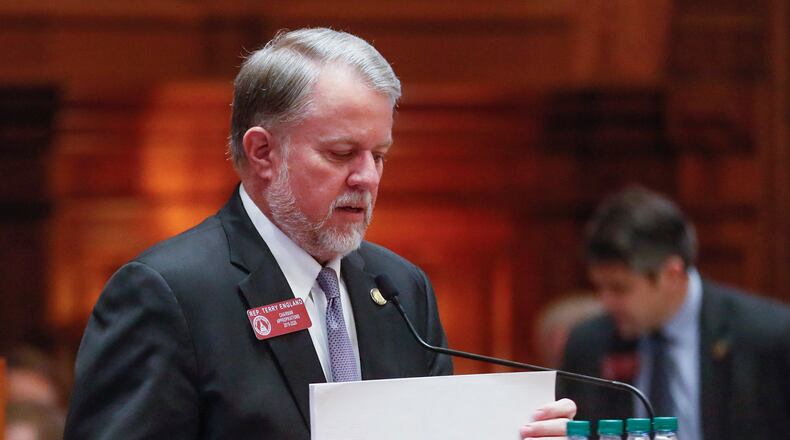The Georgia House backed a $28 billion budget Tuesday for the coming fiscal year that would provide raises to more than 200,000 teachers, university system staffers and state employers and rejects many of Gov. Brian Kemp’s proposed spending cuts.
The House passed the spending plan for fiscal 2021, which starts July 1, on a 134-35 vote. The measure now moves to the Senate for its consideration.
Teachers would get a $1,000 pay raise — starting in September — under the House plan, rather than the $2,000 Kemp proposed.
The House added 2% pay raises for university and state employees and an additional 2% to 5% in several areas where low salaries have made it difficult to keep staffers, including food safety inspectors, prison and juvenile facility guards, school bus drivers and mental health workers.
Kemp ordered state agencies in August to cut their budgets 4% this fiscal year, which ends June 30, and 6% next year to both prepare for a potential economic slowdown and pay for his priorities, such as the teacher pay raise.
But he did so without the backing of House and Senate leaders, and they didn’t support many of the cuts he recommended.
The budget is a statement of the state’s priorities — for instance, in issuing his spending cuts edict, Kemp exempted k-12 schools, most college programs, the public health care program Medicaid, and the agency that builds and maintains roads and bridges. Those areas make up more than 75% of state spending.
Approval of his proposed $2,000 teacher raise would allow Kemp, in less than two years, to fulfill one of his top 2018 campaign pledges — to give the state's more than 100,000 public school educators a $5,000 raise. Lawmakers approved a $3,000 raise last year, and House Appropriations Chairman Terry England, R-Auburn, said Georgia's teachers are the highest paid in the Southeast.
While England said House leaders supported many of Kemp’s proposed spending cuts, the chamber also used money it saved by halving the teacher pay raise to fund its budget priorities, such as restoring funding for services and filling vacant positions the governor proposed eliminating.
The House added money to expand Medicaid for low-income mothers from two to six months following the birth of a child. It added money for more assisted living home inspectors following an Atlanta Journal-Constitution investigation that found hundreds of cases of neglect and abuse had occurred in assisted living and large personal care homes.
It added 1,000 more slots for pre-kindergarten students and increased funding for more school counselors.
Even with those additions, many services face cuts next year, and some Democrats blamed it on decisions by Republican majorities to cut income taxes at the federal and state level, with most of the money, they said, going to the wealthy. Those tax cuts, they said, meant the government took in less tax revenue, forcing the state to reduce services.
"This is unfair to the taxpayers, it blames them for poor decision making," said Rep. Donna McLeod, D-Lawrenceville. "We should not allow a budget disguised as a necessary tightening of the belt."
House Minority Leader Bob Trammell, D-Luthersville, said, "With this budget, we are passing a tab for a tax cut we did in 2018."
But Rep. David Knight, R-Griffin, a House budget subcommittee chairman, said he was "appalled" by the criticism, saying many of the Democrats speaking out didn't make any suggestions to improve the budget while it was being written.
“To come up here and demagogue in an election year about how Georgia’s house is falling or its foundation is crumbling … people are flooding into this state,” he said. “Your rhetoric does not line up.”
Rep. Katie Dempsey, R-Rome, a budget subcommittee chairwoman, said, "To vote against this budget is to vote not to help some because we are not able at this time to help all."
House leaders also responded to Kemp’s handling of the budget cuts last fall by passing a bill to limit the governor’s ability to withhold spending approved by the General Assembly, as he did starting in October. Under the bill, in the event of a fiscal shortfall, all agencies would be reduced the same percentage, which means a governor couldn’t shield some areas, such as education or transportation, the way Kemp did.
It also passed a bill Tuesday requiring state agencies to send the House and Senate their budget proposals in September — now they go first to the governor — and create a board of economic advisers to give the General Assembly input in setting the annual revenue estimate.
Currently, the governor sets the revenue estimate, which determines how much money lawmakers can spend.
Kemp would likely veto any legislation that takes away a governor’s ability to withhold spending or have the General Assembly be involved in setting revenue estimates.
About the Author
Keep Reading
The Latest
Featured




